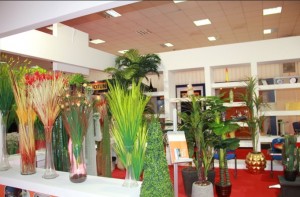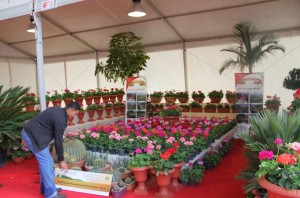By Nadia El-Ahmar.

Tripoli, 31 January 2013:
Tripoli’s Home and Garden show is underway, already attracting hundreds of visitors despite the recent wet . . .[restrict]weather. The show, Libya’s first exhibition of this kind, runs until 2 February at the Tripoli International Fairground.
Both local businesses and international firms are represented at the show. The well-known brand Seranit, which has worked on many large-scale projects in Turkey, is there. Seranit recently completed the ceramic work in Istanbul International Airport and is hoping to win a similar contract for the new Tripoli International Airport.
Seranit’s commercial manager, Louai Sherif, was optimistic about the future. He said there had been a boom in business before the revolution, and is hoping this will continue now. Sherif highlighted the lack of product variety in Libya at the moment, and said: “People want a more luxurious look for their houses.” He added: “People often overlook quality, and go for the cheaper product. That’s one problem when dealing with customers, we have to educate them.”

Jotun, a Norwegian paint company, has been working in Libya since 1999 and, with 80 dealers in the country, is now a market leader. It plans to build a factory near the Tunisian border which will produce some five million litres of paint a year for the North African market.
Ahmed Behaeri, key account manager for Jotun, told the Libya Herald that he thought many Libyans were becoming more interested in home improvements. He said it now offered a service advising customers on designs and colours.
“Because of the war in Libya, many international companies have left,” Behaeri said, “So we are now working 80% in the private sector, and 20% in the public sector.”
Another company that has started working more in the private sector is Almihrab Consulting. The firm has been working in Libya for ten years, offering architectural, structural and landscape design, as well as importing construction materials.
Mofawak Hawas, an architect working for Almihrab Consulting, told the Libya Herald that they were facing “obstacles” with starting major new projects.
With a reduction in government contracts, it is now targeting private clients, which is why it has a stand at the Home and Garden Show. It hopes the large-scale projects with foreign partners will pick up once political stability resumes.
The Home and Garden Show has been much-anticipated, with its Facebook page attracting nearly 23,000 ‘likes.’ [/restrict]










